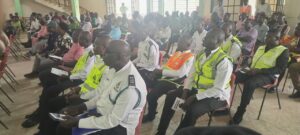The Traffictech-Gh stakeholder engagement with the intent to ensure safety on our roads has arrived in the Western Region, precisely Sekondi-Takoradi, holding engagements with its primary target audience – drivers, transport operators, and owners of vehicles.
The Traffictech-Gh is being spearheaded by the Ghana Police Service (GPS), in partnership with the National Insurance Commission (NIC), and Driver and Vehicle Licensing Authority (DVLA) amongst others.
It is a novel automated system developed by the GPS to enforce road traffic laws and regulations with the intent to improve safety on the roads in Ghana.
The system will use traffic cameras and sensors to automatically take a picture/video of vehicles that flout road traffic laws and regulations such as over-speeding and jumping red lights.

The objective is to increase compliance of road traffic laws and regulations to reduce accidents, deaths and injuries. Other traffic offences that would be enforced under the Traffictech-Gh initiative, includes expired road worthiness certificate, wrongful overtaking, non-use of seatbelts, use of mobile phones while driving, and use of expired license amongst others.
The Takoradi engagement programme brought together drivers, Ghana Private Road Transport Union (GPRTU) executives, transport operators, Drivers and Vehicle Licensing Authority (DVLA), Ghana National Fire Service (GNFS), Ghana National Road Safety Authority (GNRSA) and many others.
Opening, the engagement, the Deputy Western Regional Police Commander, Dr. Francis Kwame Kyei, indicated that the Traffic Department of the GPS had been collaborating and tabulating data on road fatalities in the country leading to the introduction of the innovative Traffic-Gh tech technology to bring an end to road safety abuses.
He mentioned the greatest threat to Ghana was road fatalities, consequently, the police had been exploring way to serve the nation as to how best road management and usage could be enforced to ensure minimised fatalities. With the arrival of the traffictech, the Deputy Regional Police Commander said he was looking forward to easier road traffic enforcement.
That apart, with technology as the backbone, human elements would be minimised.
“We anticipate human elements will be reduced, and it’s good we have partnerships here, and law enforcement officers can anticipate complimentary responses from our partners.”
He, therefore, asked the participants to take active part in the engagement by way of listening and making contributions.
Henry Asumani of the DVLA, on his part, said for the past 18 months, his office had been recording reductions in road traffic challenges. Motorcycle incidents, he indicated, were also going down.
This, he said, could not have been successful without the collaboration of the GPS, the media, and stakeholders.
However, the main challenge he identified was over-speeding. Speeding, he said, underlined all other contributions to road traffic offences, mentioning indiscipline and lack of adherence as causes of over-speeding.
Chief Supt Alexander Obeng mentioned that the introduction of the traffictech was to curb road user indiscipline using technology. With the introduction of proactive and reactive strategies, road traffic offences would go down.
The police, he told the engagement, were now moving from the traditional method of ensuring road safety, to advanced technology without the presence of personnel on the roads.
The traffic cameras, he said, were evidence gathering traffic devices that were going to be virtual fully automated and would be installed on vantage point on the highways to record traffic offences.
Present at the engagement were GPRTU Chairman Jospeh Simon Cudjoe, Superintendent Olivia Ewurabena Adiku, Regional Public Relations Officer Victor Bilson, Road Safety personnel amongst many others.










